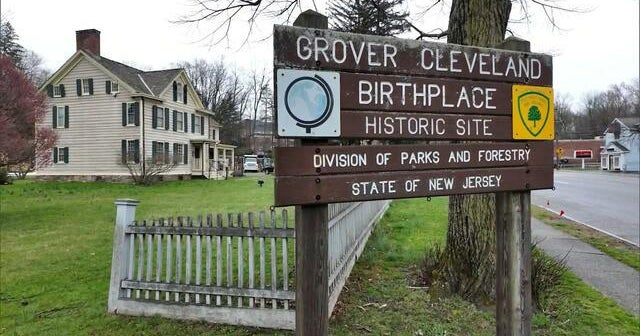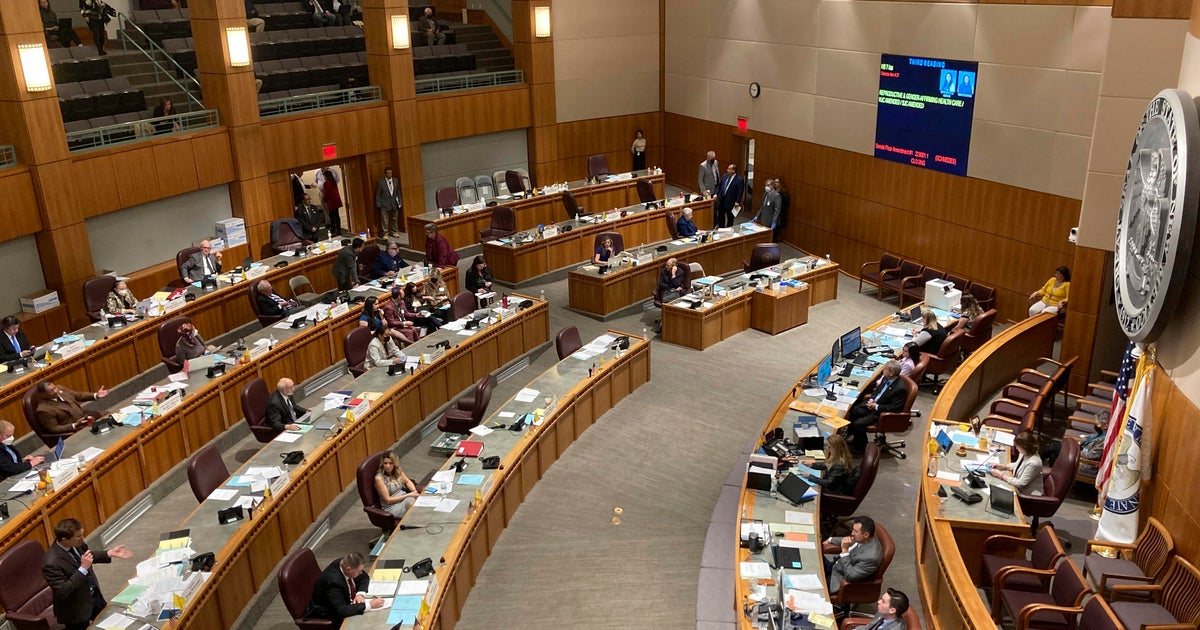CBS News
Columbus Blue Jackets player Johnny Gaudreau, brother Matthew killed in NJ crash, police say

PEDRICKTOWN, N.J. (CBS) — Columbus Blue Jackets player Johnny Gaudreau and his brother were killed in a crash Thursday night in Salem County, New Jersey, State Police confirmed to CBS News Philadelphia.
Gaudreau, 31, and his 29-year-old brother Matthew were riding bicycles on County Route 551 in Oldmans Township, Salem County on Thursday night when they were struck by a man driving a Jeep.
Police said the driver, 43-year-old Sean Higgins of Woodstown, New Jersey, attempted to pass a slower vehicle when he hit the Gaudreau brothers, who riding along the right side of the road.
The Blue Jackets confirmed the Gaudreaus’ deaths in a post on X.
“The Columbus Blue Jackets are shocked and devastated by this unimaginable tragedy,” the Blue Jackets said in a statement. “Johnny was not only a great hockey player, but more significantly a loving husband, father, son, brother and friend. We extend our heartfelt sympathies to his wife, Meredith, his children, Noa and Johnny, his parents, their family and friends on the sudden loss of Johnny and Matthew.”
A South Jersey native known as “Johnny Hockey” who grew up a fan of the Philadelphia Flyers, Johnny Gaudreau played for the Little Flyers, a youth hockey organization based in Aston, Pennsylvania, starting at the PeeWee level in 2004 and continuing into the 2008-09 season.
Both brothers played for Boston College and Johnny won the Heisman Trophy of college hockey, the Hobey Baker Award, in 2014. Johnny was a contributor to BC’s NCAA championship win in 2012, as well.
Richard T Gagnon / Getty Images
Gaudreau was drafted by the Calgary Flames in the 2011 NHL Draft. In 2022, he opted for free agency and signed with Columbus.
A speedy lefthanded shooter who played on the wing, Gaudreau was nearly a career point-per-game player, notching 743 points — 243 goals and 500 assists — over 763 games in the NHL. He set a career high in goals in the 2021-22 season, his last with the Flames, when he scored 40 goals and 75 assists for 115 points. He was a +64 player that season.
Both brothers went to Gloucester Catholic High School in Gloucester City, New Jersey, and both played hockey there. Matthew served as coach of the Gloucester Catholic hockey team after a five-year pro career.
NHL Commissioner Gary Bettman issued a statement that said in part:
“While Johnny’s infectious spirit for the game and show-stopping skills on the ice earned him the nickname ‘Johnny Hockey,’ he was more than just a dazzling hockey player; he was a doting father and beloved husband, son, brother and teammate who endeared himself to every person fortunate enough to have crossed his path.
“Gaudreau often told the story of how his father taught him to skate as a child in his home state of New Jersey and he carried that same youthful passion throughout his 11 NHL seasons. A skilled playmaker, Gaudreau participated in the NHL All-Star Game seven times where he was always a fan favorite, particularly while showcasing his talents in the various skills competitions for which he was so well suited.”
Driver in custody
The crash happened at the intersection of Auburn Road and Stumpy Lane in Pedricktown after 8 p.m.
Higgins was detained under suspicion he was under the influence of alcohol and charged with two counts of death by auto. He was taken to the Salem County Correctional Facility.
CBS News Philadelphia
This is a developing story. Stay with CBS News Philadelphia for updates.
CBS News
1 monkey recovered safely, 42 others still remain on the run from South Carolina lab

One of 43 monkeys bred for medical research that escaped a compound in South Carolina has been recovered unharmed, officials said Saturday.
Many of the others are still located a few yards from the property, jumping back and forth over the facility’s fence, police said in a statement.
The Rhesus macaques made a break for it Wednesday after an employee at the Alpha Genesis facility in Yemassee didn’t fully lock a door as she fed and checked on them, officials said.
The monkeys on Friday were exploring the outer fence of the Alpha Genesis compound and were cooing at the monkeys inside. The primates continued to interact with their companions inside the facility on Saturday, which is a positive sign, the police statement said.
Yemassee Police Department
Alpha Genesis CEO Greg Westergaard relayed that efforts to recover all the animals will persist throughout the weekend and for as long as it takes, the statement said.
Westergaard told CBS News on Thursday that a caretaker inadvertently failed to secure a door at the enclosure, allowing the monkeys to roam free.
“It’s really like follow-the-leader. You see one go and the others go,” he said. “It was a group of 50 and 7 stayed behind and 43 bolted out the door.”
Westergaard acknowledged that it would be a long process to get them back and that they didn’t want to chase the monkeys because that would spook them and make them run away.
“We’ve got them very close,” he told CBS News. “This is all like what we want to see.”
The monkeys are about the size of a cat. They are all females weighing about 7 pounds.
Alpha Genesis, federal health officials and police all said the monkeys pose no risk to public health. The facility breeds the monkeys to sell to medical and other researchers.
Alpha Genesis provides primates for research worldwide at its compound in Yemassee, about 50 miles (80 kilometers) northeast of Savannah, Georgia, according to its website.
CBS News
American nurse killed in Budapest while on vacation, Hungarian police arrest suspect

A 31-year-old American tourist was killed while on vacation in Hungary’s capital, and the suspect, a 37-year-old Irish man, has been arrested, Hungarian police said Saturday.
The victim, Mackenzie Michalski was reported missing on Nov. 5 after she was last seen at a nightclub in central Budapest.
A Facebook group called “Find Mackenzie Michalski,” created on November 7, said Michalski, went by “Kenzie.” The group confirmed her death in a statement on Friday, thanking U.S. and Hungarian authorities for “their prompt attention, diligence, care, and consideration.”
Police launched a missing person investigation and reviewed security footage from local nightclubs where they observed Michalski with a man later identified as the suspect in several of the clubs the night of her disappearance.
Police detained the man, an Irish citizen, on the evening of Nov. 7. Investigators said that Michalski and the suspect met at a nightclub and danced before leaving for the man’s rented apartment. The man killed Michalski while they were engaged in an “intimate encounter,” police said.
The suspect, whom police identified by the initials L.T.M., later confessed to the killing but said it had been an accident. Police said that he had attempted to cover up his crime by cleaning the apartment and hiding Michalski’s body in a wardrobe before purchasing a suitcase and placing her body inside.
He then rented a car and drove to Lake Balaton, around 90 miles southwest of Budapest, where he disposed of the body in a wooden area outside the town of Szigliget.
Video released by police showed the suspect guiding authorities to the location where he had left the body. Police said the suspect had made internet searches before being apprehended on how to dispose of a body, police procedures in missing person cases, whether pigs really eat dead bodies and the presence of wild boars in the Lake Balaton area.
He also made an internet search inquiring about the competence of Budapest police.
Michalski’s parents are currently in Budapest, police told The Associated Press.
Friends posted condolences on the Facebook group of candles. Michalski was a nurse practitioner, the social media post said, who used “her humor, positivity, and limitless empathy to help heal her patients and encourage family and friends alike.”
CBS News
Severe droughts threaten sustainable catch of the Amazon’s giant fish, the giant pirarucu

Two years of record-breaking drought have dealt a heavy blow to what is arguably the Amazon’s most successful sustainable economy: the managed fishery for the giant pirarucu.
In Brazil´s Amazonas state, almost 6,000 riverine dwellers authorized to fish have reported a sharp drop in production and rising costs. They are demanding aid from the federal government and debating how to adapt to climate change.
Last year’s catch totaled 70% of the government-authorized quota of 100,443 fish. This year could see an even steeper decline, since many communities still haven´t been able to fish. The season runs from June 1 to Nov. 30.
Jorge Saenz / AP
Pirarucu managed fishing began in the Amazon 25 years ago in the Mamiraua region and has since expanded. It helped the Amazon’s largest fish escape risk of extinction and is now an important source of income for locals in 10 sustainable conservation units and eight Indigenous territories, where deforestation is close to zero.
Unlike other aquatic species of the Amazon, such as river dolphins, the pirarucu — also known as arapaima — historically have proven resilient to drought and climate change. But low water levels are making it extremely difficult for fishers to transport their catch from remote lakes to major rivers and onto cities.
It’s a mammoth task. The pirarucu, which can weigh up to 200 kilograms (440 pounds), lives in large lakes that during flood season are often connected to major rivers. Fishing typically occurs when water levels begin to recede, making it easier to trap the fish and transport them out in small boats or canoes. In several areas, however, water levels dropped so quickly that this connection was cut off before fishing could begin.
In the São Raimundo community in the Medio Jurua region, fishing is scheduled to start Saturday, a two-month delay — a common situation this season. As a result, Coletivo Pirarucu, an umbrella organization that represents 2,500 riverine and Indigenous families, has requested that the federal government extend fishing season until the end of January.
Even in large rivers navigation has become problematic, raising costs and uncertainty among fishermen. It usually takes three to four days to transport fish from Carauari municipality — a major pirarucu producer — to Manaus, the Amazon´s largest city. During the peak of the drought, the trip increased to 10 days, and the freight price has doubled.
Tough as pirarucu are, they are not immune to climate change, according to researcher Adalberto Luis Val from the National Institute for Amazonian Research. He says rising temperatures and severe droughts are exacerbating the “death trio” for all fish: warmer water, more CO2 and less oxygen.
The pirarucu has evolved to breathe air but is far from invincible.
“No fish can regulate body temperature,” Val said. “Then there’s water scarcity. As its level drops, you start to get a high amount of suspended material, leading to sludge buildup. It sticks to the gill area, blocking the processes that occur there.”
Fearing deteriorating conditions in the following decades, Coletivo Pirarucu contends that the fishermen should be entitled to compensation for losses caused by climate change. “This crisis not only challenges the resilience of communities but also highlights the urgent need for climate change adaptation and mitigation strategies,” the nonprofit stated in an open letter last week.
In an e-mail response, James Bessa, a federal official overseeing pirarucu management, said that Ibama, Brazil´s environmental agency, is working with other public bodies and local fishing associations to reduce the impact of extreme events like droughts and floods. He said there are plans to start scientific studies and closer monitoring to provide insights into ways to support riverine and Indigenous communities in sustaining their fishing activities.
Adevaldo Dias — a riverine leader who presides over the Chico Mendes Memorial, a nonprofit that assists traditional non-Indigenous communities — argues that adopting additional public policies to help the fishermen is a matter of climate justice.
“The Indigenous and riverine peoples have minimal impact on the environment,” Dias said. “We know that conserving the forest benefits both us and those outside it. And when extreme climate events occur, they are the most vulnerable.”












